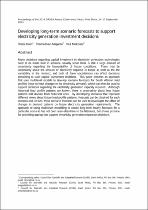 ResearchSpace
ResearchSpace
Developing long-term scenario forecasts to support electricity generation investment decisions
JavaScript is disabled for your browser. Some features of this site may not work without it.
- ResearchSpace
- →
- Research Publications/Outputs
- →
- Conference Publications
- →
- View Item
| dc.contributor.author |
Koen, Renée

|
|
| dc.contributor.author |
Magadla, T

|
|
| dc.contributor.author |
Mokilane, P

|
|
| dc.date.accessioned | 2014-10-24T13:21:55Z | |
| dc.date.available | 2014-10-24T13:21:55Z | |
| dc.date.issued | 2014-09 | |
| dc.identifier.citation | Koen, R, Magadla, T and Mokilane, P. 2014. Developing long-term scenario forecasts to support electricity generation investment decisions. In: Proceedings of the 2014 ORSSA Annual Conference, Parys, Free State, 14-17 September 2014 | en_US |
| dc.identifier.isbn | 978-1-86822-656-6 | |
| dc.identifier.uri | http://hdl.handle.net/10204/7734 | |
| dc.description | Proceedings of the 2014 ORSSA Annual Conference, Parys, Free State, 14-17 September 2014 | en_US |
| dc.description.abstract | Many decisions regarding capital investment in electricity generation technologies need to be made well in advance, usually when there is still a large amount of uncertainty regarding the favourability of future conditions. There may be uncertainty about the amount of electricity required in future as well as the the variability in the demand, and both of these uncertainties can affect decisions pertaining to such capital investment decisions. This paper presents an approach that uses multilevel models to develop scenario forecasts for South African load profiles (hour-to-hour changes in the electricity demand), which can then be used to support decisions regarding the electricity generation capacity required. Although historical load profile patterns are known, there is uncertainty about how future patterns will deviate from historical ones. By developing scenarios that represent different views about future load profile patterns, forecasts can be obtained for each scenario and, in turn, these scenario forecasts can be used to investigate the effect of changes in demand patterns on future electricity generation requirements. The approach of using multilevel modelling to obtain long-term hourly forecasts for a particular scenario has not been seen elsewhere in the literature, but shows promise for providing appropriate support electricity generation expansion decisions. | en_US |
| dc.language.iso | en | en_US |
| dc.relation.ispartofseries | Workflow;13544 | |
| dc.subject | Electricity generation technologies | en_US |
| dc.subject | Electricity load profiles | en_US |
| dc.subject | Forecasting load profiles | en_US |
| dc.subject | Long-term load forecasting | en_US |
| dc.subject | Multilevel models | en_US |
| dc.subject | Scenario forecasts | en_US |
| dc.title | Developing long-term scenario forecasts to support electricity generation investment decisions | en_US |
| dc.type | Conference Presentation | en_US |
| dc.identifier.apacitation | Koen, R., Magadla, T., & Mokilane, P. (2014). Developing long-term scenario forecasts to support electricity generation investment decisions. http://hdl.handle.net/10204/7734 | en_ZA |
| dc.identifier.chicagocitation | Koen, Renée, T Magadla, and P Mokilane. "Developing long-term scenario forecasts to support electricity generation investment decisions." (2014): http://hdl.handle.net/10204/7734 | en_ZA |
| dc.identifier.vancouvercitation | Koen R, Magadla T, Mokilane P, Developing long-term scenario forecasts to support electricity generation investment decisions; 2014. http://hdl.handle.net/10204/7734 . | en_ZA |
| dc.identifier.ris | TY - Conference Presentation AU - Koen, Renée AU - Magadla, T AU - Mokilane, P AB - Many decisions regarding capital investment in electricity generation technologies need to be made well in advance, usually when there is still a large amount of uncertainty regarding the favourability of future conditions. There may be uncertainty about the amount of electricity required in future as well as the the variability in the demand, and both of these uncertainties can affect decisions pertaining to such capital investment decisions. This paper presents an approach that uses multilevel models to develop scenario forecasts for South African load profiles (hour-to-hour changes in the electricity demand), which can then be used to support decisions regarding the electricity generation capacity required. Although historical load profile patterns are known, there is uncertainty about how future patterns will deviate from historical ones. By developing scenarios that represent different views about future load profile patterns, forecasts can be obtained for each scenario and, in turn, these scenario forecasts can be used to investigate the effect of changes in demand patterns on future electricity generation requirements. The approach of using multilevel modelling to obtain long-term hourly forecasts for a particular scenario has not been seen elsewhere in the literature, but shows promise for providing appropriate support electricity generation expansion decisions. DA - 2014-09 DB - ResearchSpace DP - CSIR KW - Electricity generation technologies KW - Electricity load profiles KW - Forecasting load profiles KW - Long-term load forecasting KW - Multilevel models KW - Scenario forecasts LK - https://researchspace.csir.co.za PY - 2014 SM - 978-1-86822-656-6 T1 - Developing long-term scenario forecasts to support electricity generation investment decisions TI - Developing long-term scenario forecasts to support electricity generation investment decisions UR - http://hdl.handle.net/10204/7734 ER - | en_ZA |





